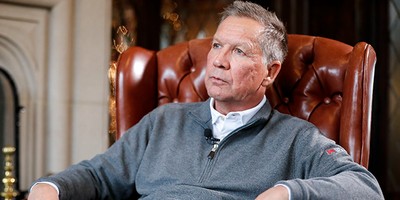WASHINGTON -- According to one survey, just 7 percent of elite American scientists believe in a personal god -- the kind to whom you pray. About 8 percent, however, affirm their belief in personal immortality -- indicating that some egos are so large that they fill eternity.
Should it matter that President Obama's nominee to be director of the National Institutes of Health -- the Supreme Court nomination of the scientific world -- is part of the believing few?

Francis Collins presents a perfect test case. His qualifications are beyond dispute. As a pioneering "gene hunter," he helped identify the genetic markers for cystic fibrosis, neurofibromatosis, Huntington's disease and adult onset diabetes. He was in charge of the program at NIH that mapped the human genome, the biological equivalent of the Apollo space program. He is a leading advocate of personalized medicine (the use of genetic knowledge to tailor individual disease prevention and treatment) and of legislation to protect genetic privacy, so that sensitive information can't be used by employers and insurers to discriminate.
Collins is also a theist. And more than that, an evangelical Christian. And more than that, he sings hymns while playing the guitar.
For some scientists, this combination of scientific excellence and religious faith is contradictory -- like being a geneticist and believing in unicorns or astrology. "You clearly can be a scientist and have religious beliefs," says Peter Atkins of Oxford University. "But I don't think you can be a real scientist in the deepest sense of the word because (religion and science) are such alien categories of knowledge." Behind this assertion lies the assumption that the scientific category of knowledge has superseded the religious one.
Recommended
To which Collins, who has written and spoken extensively on this topic, replies that there are two categories of knowledge, two ways of knowing. And though they are different from one another, they are not "alien" to one another, or contradictory.
The first category is scientific knowledge -- the kind achieved through testing, weighing and probing. And within its competence, according to Collins, science is supreme. He is, for example, a strong defender of Darwinian evolution, a theory he calls "absolutely incontrovertible." Collins is particularly compelling when talking about the genetic evidence for the common ancestry of all living things -- the precise similarities between our DNA and that of other species, and the precisely located mutations that can only be explained by common origins. Religious texts, in his view, must be interpreted in light of these scientific facts.
But Collins argues that there is a second way of knowing -- a realm of morality and metaphysics that involves not physical proof but probability based on evidence. Some scientists assert that anything beyond the possibility of touching and testing is equally mythological -- from unicorns to God to morality to hope to meaning to love. Collins calls this kind of reductionism a "logical fallacy." By definition, science only yields information about the physical world, which does nothing to prove that the physical world is all there is. As human beings, we still seek to know why things exist and how we should live. Science is silent on these matters; we need not be. Collins contends that the moral law within us, and the fine- tuning of physical constants in the universe, provides "signposts" (not proofs) that lead toward God. (See Collins' book "The Language of God: A Scientist Presents Evidence for Belief" for his full and informed explanation.)
For Collins, modern science and Christianity are not competing answers to the same question; they are ways of thinking about two very different sets of questions, both of which should be taken seriously.
Collins' appointment says something good about the maturity of modern evangelicalism, which is starting to abandon some of its least productive debates with modernity. Criticisms of evolution, rooted in 19th-century controversies, have done little more than set up religious young people for entirely unnecessary crises of faith as they encounter scientific knowledge. In the running conflict of modern biology and evangelicalism, Collins is a peacemaker.
And Collins' appointment says something good about the maturity of President Obama. This move has invited criticism from the secular left. It is unlikely to appease religious conservatives who assume cynicism from Obama. But this seems to be a case where the president simply picked the best person for the job. In the process, Obama has affirmed something important: that anti-supernaturalism is not a litmus test at the highest levels of science.
























Join the conversation as a VIP Member